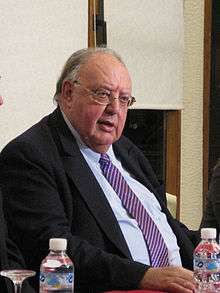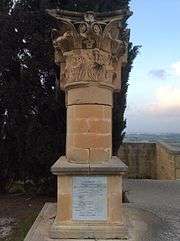Theodoros Pangalos (politician)
Theodoros Pangalos (Greek: Θεόδωρος Πάγκαλος, born 17 August 1938) is a Greek politician, and leading member of the Panhellenic Socialist Movement. He served as the Deputy Prime Minister of Greece, responsible for the coordination of the Government Council for Foreign Affairs and Defense (KYSEA) and the new Economic & Social Policy Committee from 2009 to 2012 [1]
Theodoros Pangalos Θεόδωρος Πάγκαλος | |
|---|---|
 | |
| Deputy Prime Minister of Greece | |
| In office 7 October 2009 – 17 May 2012 | |
| Prime Minister | George Papandreou Lucas Papademos |
| Preceded by | Tzannis Tzannetakis (1993) |
| Succeeded by | Evangelos Venizelos |
| Minister for Foreign Affairs | |
| In office 22 January 1996 – 18 February 1999 | |
| Prime Minister | Costas Simitis |
| Preceded by | Karolos Papoulias |
| Succeeded by | George Papandreou |
| Alternate Minister of Foreign Affairs | |
| In office 13 October 1993 – 8 July 1994 | |
| Prime Minister | Andreas Papandreou |
| In office 5 June 1985 – 26 July 1985 | |
| Prime Minister | Andreas Papandreou |
| Personal details | |
| Born | 17 August 1938 Eleusis, Greece |
| Political party | United Democratic Left (Formerly) Communist Party (Formerly) Panhellenic Socialist Movement |
Early life
Pangalos was born in Eleusis, Greece. He is the grandson of General and 1926 dictator Theodoros Pangalos. Some of his ancestors were of Arvanite origin.[2][3]
Pangalos was member of the left-wing Lambrakis Youth and, in 1964, a candidate for the Hellenic Parliament with the United Democratic Left (EDA). Pangalos opposed the 1967 military dictatorship, and was deprived by the junta of his Greek citizenship in 1968.
Political career
He became a member of the Communist Party of Greece, rising to its Central Committee, before eventually joining the PASOK socialist party during the Metapolitefsi. He was elected for the first time as an MP in the 1981 general election with PASOK and has been continuously re-elected since until 2012.
In 1996 he was appointed Minister for Foreign Affairs and held the post until his resignation in 1999, in the aftermath of the scandal involving the Kurdish nationalist leader, Abdullah Öcalan: helped by individual members of the Greek intelligence agencies Öcalan entered Greece illegally and was then deported to Kenya, where he was captured by Turkish agents after leaving the Greek embassy at Nairobi.
He was briefly made Minister for Culture in 2000, an appointment which was widely criticized, in view of his previous statement that artists who had protested his handling of the Öcalan affair were kuradomanges (turd tough guys).[4]
Quotes
- "Mazi ta fagame" (we are all responsible for the debt).
In popular culture
A Greek experimental pop band named Plastic Flowers sampled his famous speech 'mazi ta fagame' in their song 'Sinking ship-vanished crew'.[5][6]
References
- "New Papandreou government Cabinet announced". Ana-mpa.gr. 6 October 2009. Retrieved 9 October 2009.
- Πάγκαλος, Θεόδωρος (1950). Τα απομνημονευματά μου, 1897-1947: η ταραχώδης περιόδος της τελευταίας πεντηκονταετίας.
- "Τα Ελευσίνια μυστήρια δύο υπουργών". tovima.gr. Retrieved 3 January 2013.
- "Archived copy". Archived from the original on 11 March 2007. Retrieved 10 August 2006.CS1 maint: archived copy as title (link)
- "Natural Conspiracy, by Plastic Flowers". Plastic Flowers. Retrieved 10 November 2018.
- "I Upset My Least Favourite Big Fat Greek Minister". Vice.com. 20 May 2013. Retrieved 10 November 2018.
External links
- Official Website of Theodoros Pangalos (in Greek)
- Terms of office of Theodoros Pangalos at the Hellenic Parliament (in English)
- Theodoros Pangalos on IMDb
| Political offices | ||
|---|---|---|
| Preceded by Karolos Papoulias |
Minister for Foreign Affairs 1996–1999 |
Succeeded by George Papandreou |
| Vacant Title last held by Tzannis Tzannetakis |
Deputy Prime Minister of Greece 2009–2012 Served alongside: Evangelos Venizelos (2011–2012) |
Succeeded by Evangelos Venizelos |
